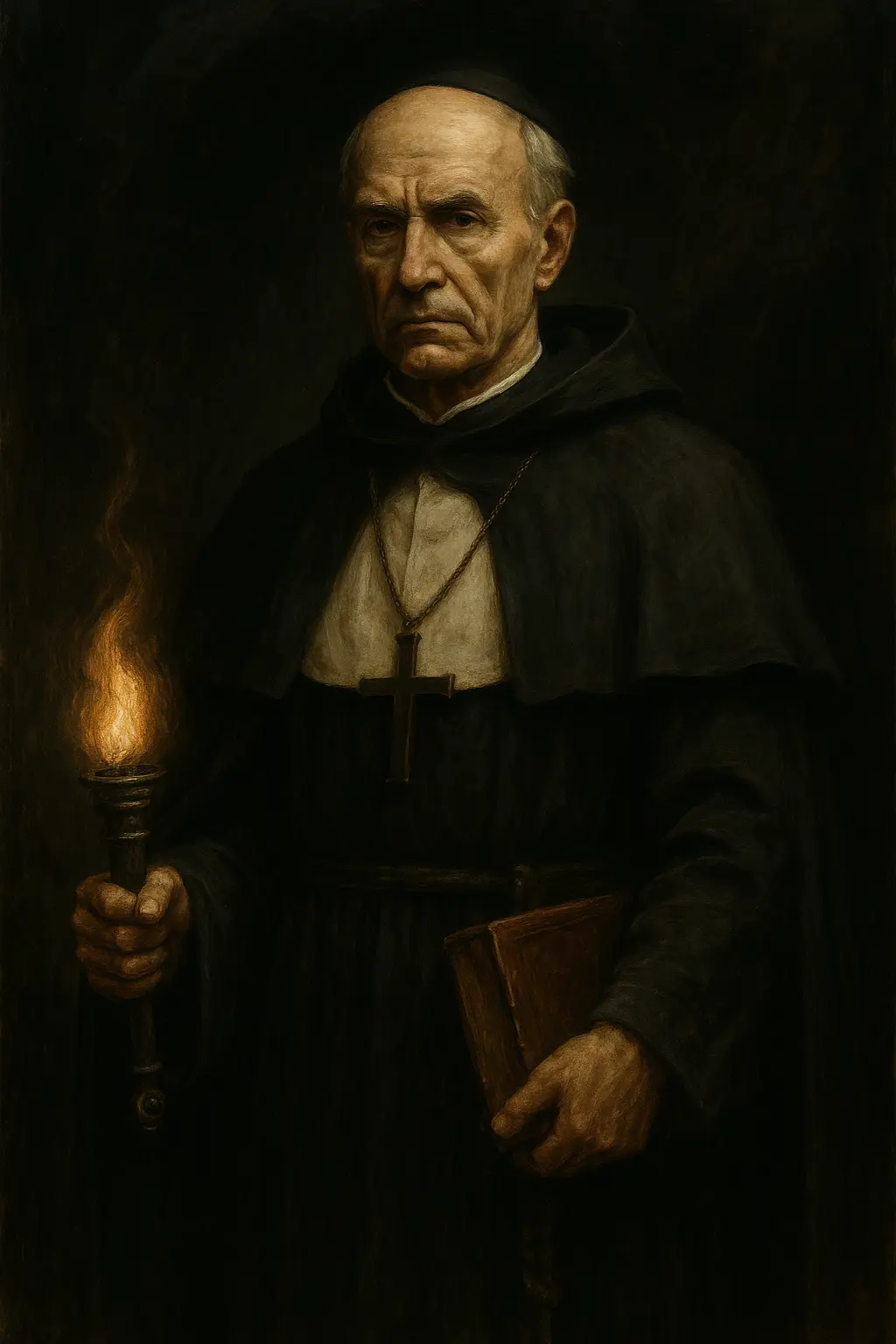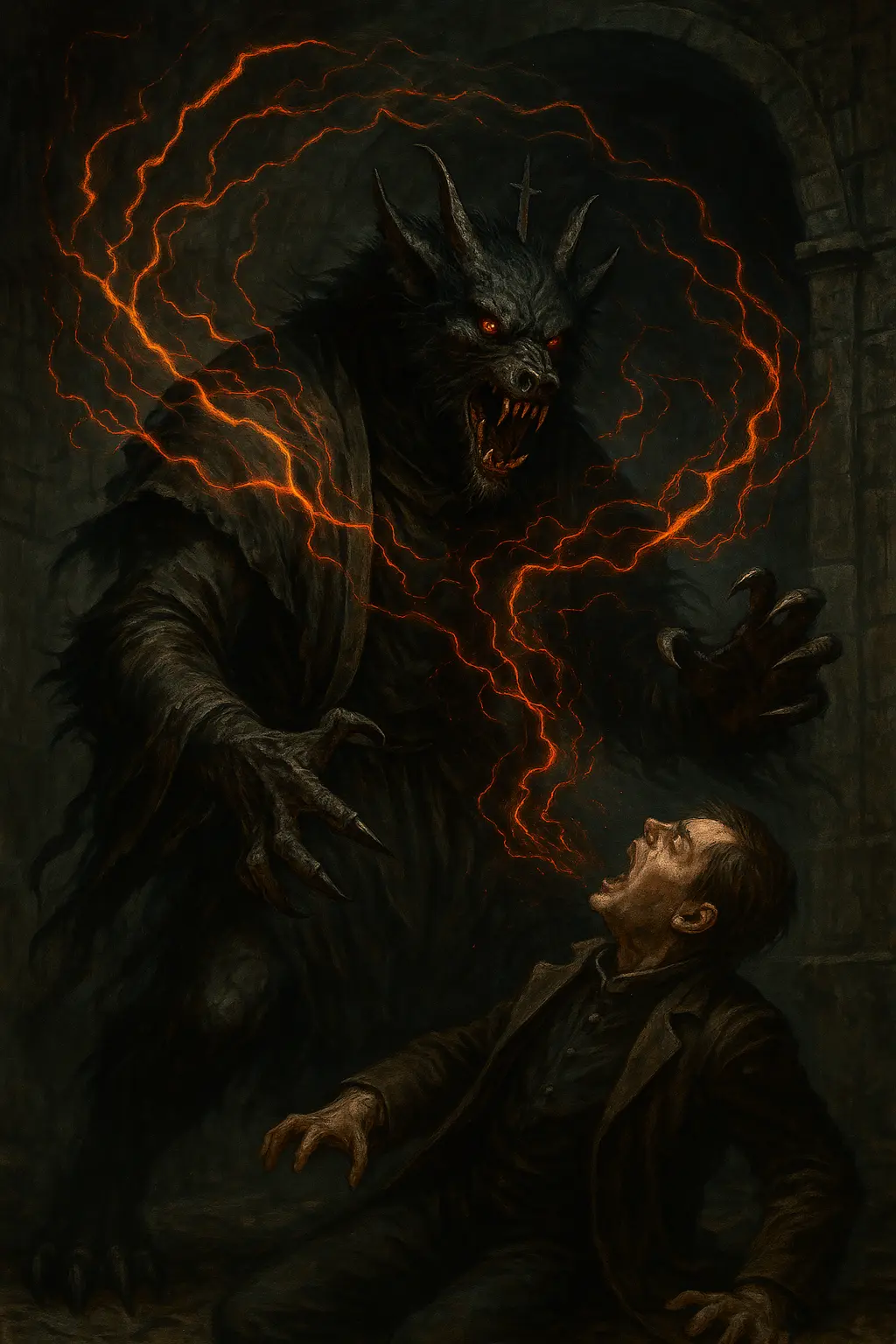
Jakob Sprenger
Abomination | Second Inquisition | Gladius Dei
Jakob Sprenger does not believe he was corrupted. He believes he was chosen.
Born in Rheinfelden in the early 15th century, Sprenger lived as a Dominican scholar, Master of Theology, Dean of the University of Cologne, and alleged co-author of the Malleus Maleficarum. He was a man who believed that sin had architecture—that heresy moved through the world like blood through the body, and that the tools of purification must be shaped with equal design.
His transformation began not in doubt, but in revelation. Two years before his supposed death, Sprenger and his forces destroyed a coterie of fledgling Tremere affiliated with the Horned Society. One of them survived—young, terrified, and eager to bargain. She promised him immortality. He gave her chains.
For nearly a year, she was his living subject—studied under fire, confession, and liturgy. She revealed the structure of her Clan's sorcery and the heresies of its foundation. When her secrets were exhausted, she was given Final Death. But Sprenger's hunger had only begun. Using her testimony, he sought out her sire's hidden library—long abandoned after her diablerie. There, in cracked volumes and infernal marginalia, he found what would become the root of his Stegnum Luce—Pathway of Light.
He learned how blood could be transmuted—not chemically, but spiritually. With leeches reared in holy water, he developed a process of cleansed vitae—the blood of Kindred, extracted and ritualized until it no longer carried the Curse. He could draw power from it without becoming bound, or Damned.
The Holy See did not punish him. They encouraged him. The very notion of the Stegnum Luce—a Pathway of Light through which the soul might transcend death without succumbing to damnation—ignited a fervor in the halls of power. In a Church dominated by aging Cardinals, whispers of a controlled, ecclesiastically sanctioned fountain of youth spread like holy fire. In Sprenger's treatises, they saw not only chosen inheritors—men who might step beyond flesh while remaining within grace—but a way to secure divine legacy, to mirror Christ without becoming Cain. It was not rebellion. It was sanctification through control.
The subject was not chosen. He was taken—a Brujah of old blood, captured not as a beast but as a man who had lived, fought, and endured before his Embrace. He had believed in something once. Now, he suffered in the custody of a man who claimed to save the world.
For ten years, Sprenger worked his rituals on him—benedictions spoken with gentle conviction, injections administered with calm precision, and rites of transformation recited in the voice of a friend. He fed the Brujah human blood—at first unwillingly, then ritually, and finally without resistance. And through it all, the Abbot smiled and forgave, as if it were penance shared between brothers.
The captive wept. He raged. He endured. But even he, predator and sinner, could not always tell whether the monster was inside himself—or standing at his bedside, whispering grace.
When he was taken in a Kindred raid, Sprenger felt no relief. Only absence.
The Church demanded continuation. Sprenger petitioned to join Gladius Dei—not as a soldier, but as a hunter. With a clutch of warriors at his back, he would find new specimens. He would gather more knowledge. And he did.
In the late 18th century, during Napoleon's march through northern Italy, Sprenger and his agents captured Alessandro Monteverdi, a Lasombra noble whose estate had already been shattered by French cannons. Monteverdi was perfect—ancient, hollowed, steeped in the Abyss. For over two centuries, he was Sprenger's subject. It was from him that Sprenger gained access to Abyssal power, harvesting it through years of prayer and violation.
Sprenger's power deepened further with his discovery of the Ritual of Sacred Rebirth—a rite adapted from warped Black Spiral Dancer theology. When he ordered the execution of the Garou known as Grime-Smile, he ensured the body was preserved. Later, he skinned the creature and bound its spirit to his own, gaining access to Rage, Gnosis, and Garou rites—a wolf's soul nestled beneath his prayers.
Nephandi followed. When he faced them in the field, he destroyed them not only in body, but in essence—stripping their Avatars through faith-forged rituals and binding the void-taint within himself, burning it clean.
To Sprenger, these three dark inheritances—Abyssal, Garou, and Nephandi—form a Manifest Trinity. By carrying each within his body, cleansed and subordinated, he becomes what the Church once dreamed: the Almighty's final weapon. One who will not only purge the world, but storm the Abyss and judge it from within.
His Thaumaturgy is incomplete—fragmentary, flawed—but his True Faith is absolute. He walks untouched through consecrated wards. His presence is a pressure that cracks the will of lesser beings. Yet even he is not immune. The damage accumulates. The cracks widen. When he captures Hannah Knight in the modern nights, her presence—and her touch—slips through a fissure in his mind. She cannot control him, but she can awaken something monstrous. Under her influence, he enters a frenzy of indiscriminate slaughter. It is not possession. It is revelation unbound.
Sprenger remains unaware. To him, it was divine wrath. The others were merely collateral.
He does not fear the Abyss. He believes he is its reckoning.

The Manifest Trinity
It is not often seen, even by his enemies. It is not something he invokes lightly, nor is it the result of frenzy or loss of control. It is a form born from design—a deliberate rite of convergence, where each of the three legacies he carries is allowed to bloom, violently, beneath the skin.
When Sprenger enters his war-form, it is not transformation. It is revelation.
His body distends and elongates—not like a beast, but like a judgment grown too large to remain hidden. It resembles the Crinos form of the Garou, but wrong, as if shaped by memory rather than lineage. Shadow pulses beneath his skin, limbs sharpen into cruciform tension, and his bones echo with the sound of prayer spoken backward.
His eyes—if they remain—burn not with rage, but with certainty.
Rage, Gnosis, and Abyssal will surge in balance. Cainite frenzy simmers beneath the surface, suppressed only by the gravity of his Faith. Quintessence bleeds off him like fog, but there is no Paradox backlash. There is only silence. The kind that comes before obliteration.
This form is not sustained by blood or willpower. It is sustained by doctrine. It is the body of a saint, rewritten by war.
Where he walks in this state, nothing of the old world remains. And that is the point.
The horror of the form is not its violence, but its intent. He is not a monster who lost control. He is a martyr who gave himself willingly to the lion. Every power within him was harvested by choice, pressed into ritual, and sealed beneath scripture. He is what the Church dared to imagine but never had the strength to summon.
To see this form is to witness blasphemy made sacred—the Word made monstrosity. It is not fear he inspires, but dissonance. A crisis of faith in all who behold him. Because what walks among them is not wrong by accident. It is righteousness without permission.
There are no roaring declarations, no indulgent madness. Only judgment incarnate, brought forth by a man who believes he has surpassed even the Papacy in vision and sacrifice. He is not a heretic.
He is their successor.
Storyteller Perspective
Sprenger is a man of silence and sacrament. He speaks plainly, with the weight of certainty. There is no cruelty in his voice, only liturgical inevitability. His presence is an act of erasure—for sin, for corruption, for heresy.
But the modern nights have reshaped him. His belief system, once scholastic and sanctified, is now refracted through lenses of contradiction: the Abyssal power drawn from a Lasombra's blood, the wild Rage and inherited deformity of a fallen metis, and the Qlippothic residue left from devoured Nephandi Avatars. These forces twist his perception—not into delusion, but into a higher form of clarity that others cannot follow. He does not doubt his purpose. He doubts the world's ability to recognize it.
He is both ascetic and fevered. His eyes, when calm, are serene; when moved, they blaze with something ancient and broken. His Saint—the Frankensteinian tapestry of devoured Avatars—whispers through ritual, memory, and judgment. It is not a voice, but a structure of belief reinforced by suffering, echoing across the void he has chosen to sanctify. The Madness inherited from Grime-Smile does not manifest in chaos, but in the quiet belief that he alone can see the full design of salvation, even if it requires the destruction of every living thing to fulfill it.
Sprenger does not break. He erodes. What you thought was resistance is merely delay.
He is not a man. He is the final act of judgment that never ends.